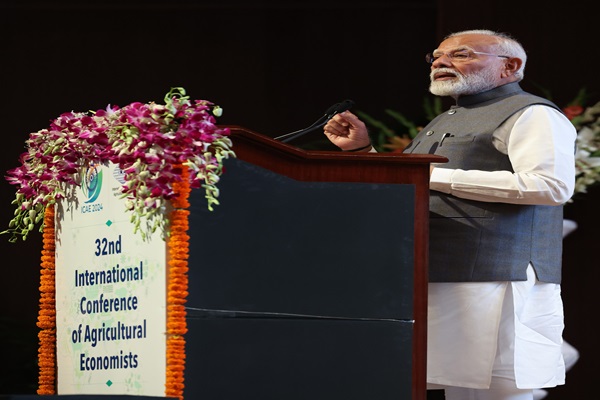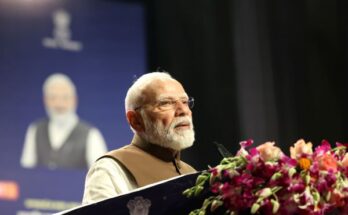
Team News Riveting
New Delhi, August 3
Today, Prime Minister Narendra Modi inaugurated the 32nd International Conference of Agricultural Economists (ICAE) at the National Agricultural Science Centre (NASC) Complex in New Delhi.
This year’s conference, themed “Transformation Towards Sustainable Agri-Food Systems,” addresses the urgent need for sustainable agriculture amidst global challenges such as climate change, resource degradation, rising production costs, and conflicts. The event saw the participation of around 1,000 delegates from approximately 75 countries.
In his address, Prime Minister Modi expressed delight at hosting the ICAE in India after 65 years. Welcoming dignitaries on behalf of India’s vast agricultural community, he highlighted the country’s rich agricultural heritage and the ancient Indian emphasis on science and logic in agriculture. He noted that India, home to more than 500 million livestock, boasts a robust system of agricultural research and education, with over 100 ICAR research institutes, 500 agricultural colleges, and 700 Krishi Vigyan Kendras.
Prime Minister Modi emphasized the relevance of India’s diverse agro-climatic zones and the significance of its agricultural produce. He recalled the last ICAE held in India, a time when the country was newly independent and facing significant food security challenges. Today, India has transformed into a food surplus nation, becoming the largest producer of milk, pulses, and spices, and the second-largest producer of food grains, fruits, vegetables, cotton, sugar, tea, and farmed fish.
Highlighting India’s role in global food security, Modi stressed the importance of sustainable and climate-resilient farming practices. He cited examples of successful initiatives like the promotion of chemical-free natural farming, the development of climate-resilient crop varieties, and the cultivation of superfoods such as black rice and millets. Modi reiterated India’s commitment to sharing its agricultural innovations and experiences with the global community.
The Prime Minister also discussed India’s efforts to integrate modern technology into agriculture. He mentioned initiatives like the Soil Health Card, solar farming, the e-NAM digital agriculture market, the Kisan Credit Card, and the PM Fasal Bima Yojana. He underscored the impact of digital advancements, such as the PM Kisan Samman Nidhi scheme, which transfers funds directly to farmers’ bank accounts, and the promotion of drones in farming, enhancing productivity and efficiency.
Concluding his speech, Modi emphasized the importance of global collaboration in achieving sustainable agri-food systems. He expressed confidence that the conference would foster valuable exchanges of knowledge and ideas among participants.
The event was attended by Union Minister for Agriculture and Farmers’ Welfare Shivraj Singh Chauhan, NITI Aayog Member Prof. Ramesh Chand, Conference President Prof. Matin Qaim, and ICAR DG Dr. Himanshu Pathak.
“Agriculture is at the center of India’s economic policies”, the Prime Minister underlined as he mentioned that the 90 percent of small farmers of India who own little land make for the biggest strength of India’s food security. He pointed out that a similar situation is prevalent in several developing countries in Asia making India’s model applicable. Giving the example of natural farming, the Prime Minister said that the positive results of promoting chemical-free natural farming on a large scale can be seen in the country. He also mentioned a big focus on sustainable and climate-resilient farming in this year’s budget as well as developing a complete ecosystem to support India’s farmers. Highlighting the government’s emphasis on research and development related to climate-resilient crops, the Prime Minister informed that nearly nineteen hundred new climate-resilient varieties have been handed to the farmers in the last 10 years. He gave examples of rice varieties in India that require 25 percent less water than traditional varieties and the emergence of black rice as a superfood. “Black rice from Manipur, Assam and Meghalaya is the preferred choice due to its medicinal value”, he said, adding that India is equally eager to share its related experiences with the world community.
Background
The triennial ICAE conference, organized by the International Association of Agricultural Economists, is being held from August 2 to 7, 2024. The conference aims to address the pressing need for sustainable agriculture in the face of global challenges. It provides a platform for young researchers and professionals to present their work, network with peers, and influence policymaking on national and global scales. The event showcases India’s proactive approach to agricultural challenges and its advancements in digital agriculture and sustainable agri-food systems.



